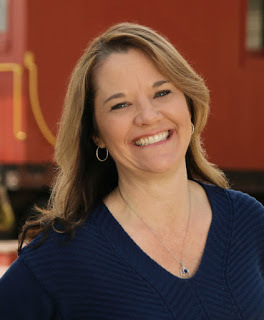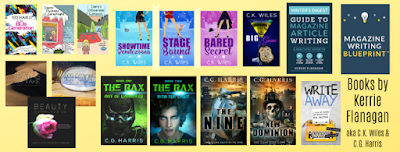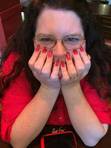My Writing Journey—What I did Right and What I Wish I had Done Differently
By Guest Kerrie Flanagan
The writing journey can be a long and winding road with bumps, detours, and success along the way. These four authors share what they believe they did right along the way and what they wish they had done differently.

One Thing I Did Right!
Jamie Raintree: I think believing in myself is the foundation of any and all success that comes in publishing, however you define success. (And defining success for yourself is another important key!) The author's journey is full of ups and downs and the only way to weather them is to have a deep faith in yourself that allows you to keep writing and keep putting yourself out there, no matter what the publishing landscape looks like and no matter how many times you fall down along the way. How do you build that kind of confidence? For me, it has been by doing the work. Study the craft exhaustively, stay in touch with what's happening in the industry as much as your inner artist will allow, and commit to the long game.
Windy Lynn Harris: I bought books that I admired and dissected them to figure out the mechanics behind the magic. There is something to learn from every author on the shelf.
Sara Jade Alan : The best thing I did on my writing journey—after I finished my terrible first draft—was to find a writing community and critique partners. I took classes, went to writing conferences, met up with my critique partners once a month, and became an active member of Lighthouse Writers Workshop and, later, SCBWI. Not only did it help my craft, but it also buoyed my spirit to be alongside kind, fun, creative friends on the same journey.
William Kennower: I asked myself, “What would you write whether it got published or not?” The answer was different than what I had been writing at the time. That one question changed trajectory of my career and is in many ways responsible for all the success I’ve had.
One Thing I Wish I Would Have Done Differently
Jamie Raintree: I wish I would have stood up for my own voice and my own vision for my work sooner. Wanting to be published sometimes encouraged me to compromise parts of my story that I still regret. But it was a learning process, and what I learned is that you should never put anyone in the industry on a pedestal so high that you forget that you're all in the trenches together. Everyone on your team wants your book to be as successful as you do. Their suggestions come from the best intentions and lots of experience, but if something doesn't feel right, it's okay to disagree and brainstorm ways to make something work so that everyone on your team feels good about it. Be respectful, always be humble in your craft and open to improvement, but also remember that no one knows your story better than you do. Trust yourself.
Windy Lynn Harris: I wish I would have given myself more credit along the way. I knew my first couple of books weren’t very good, but I sent them out anyway, hoping someone would pluck me out of the slush pile and show me how to improve my writing. That led to (well deserved) rejections, which had me doubting myself. I was working and improving, but rejection stings and it did set me back. It took years to find the confidence to finish another book. I wish I’d done it sooner!
Sara Jade Alan: Yes! I wish I’d been even more patient. I thought I was being patient—after all, it took ten years from starting my first draft to signing a book contract. Now I see that when it came to signing with an agent (who I parted ways with a year later), I ignored a few red flags. Because I wanted help navigating the book contract I’d gotten on my own, and I wanted so much for this to be the partner I’d been waiting for, I let myself get blinded by the excitement. It’s a tricky balance, because you can’t necessarily hold out for perfection either. When making big decisions in writing, as in life, you have to dig deep, be honest with yourself and try not to make choices out of fear or eagerness.
William Kennower: Focused on less on results on more on process. For years I was too obsessed with publication and success, and not enough on whether what I was writing was right for me, whether I was loving the experience of writing, whether I was always happy writing. I think this is common for a lot of writers, particularly if, like me, they don’t have another meaningful career they’re pursuing simultaneously.
Today, we'd love for you to share one thing you did right and one thing you wish you'd done differently (in your writing career or in other careers if you're not a writer)! Kerrie plans to drop in to answer questions as well!
****
Kerrie Flanagan is an author, writing consultant, presenter, and freelance writer with over 20 years’ experience in the publishing industry. She is part of the Writing Day Workshop team, and coordinates one-day writing conference throughout the country. See if there is one near you.She is the author of, The Writer's Digest Guide to Magazine Article Writing and the creator of the Magazine Writing Blueprint . In addition, she has published twelve other books, including three series’ with a co-author, under the pen names, C.K. Wiles and C.G. Harris. Her articles and essays have appeared in publications and anthologies including Writer's Digest, Alaska Magazine, The Writer, FamilyFun, and six Chicken Soup for the Soul books. Her background in teaching, and enjoyment of helping writers has led her to present at writing conferences across the country and teach continuing studies classes through Stanford University. Visit her website to see where she is speaking next. Twitter: Kerrie_Flanagan
Facebook: @KerrieFlanaganWriter
Instagram: Kerrie Flanagan

The writing journey can be a long and winding road with bumps, detours, and success along the way. These four authors share what they believe they did right along the way and what they wish they had done differently.

One Thing I Did Right!
Jamie Raintree: I think believing in myself is the foundation of any and all success that comes in publishing, however you define success. (And defining success for yourself is another important key!) The author's journey is full of ups and downs and the only way to weather them is to have a deep faith in yourself that allows you to keep writing and keep putting yourself out there, no matter what the publishing landscape looks like and no matter how many times you fall down along the way. How do you build that kind of confidence? For me, it has been by doing the work. Study the craft exhaustively, stay in touch with what's happening in the industry as much as your inner artist will allow, and commit to the long game.
Windy Lynn Harris: I bought books that I admired and dissected them to figure out the mechanics behind the magic. There is something to learn from every author on the shelf.
Sara Jade Alan : The best thing I did on my writing journey—after I finished my terrible first draft—was to find a writing community and critique partners. I took classes, went to writing conferences, met up with my critique partners once a month, and became an active member of Lighthouse Writers Workshop and, later, SCBWI. Not only did it help my craft, but it also buoyed my spirit to be alongside kind, fun, creative friends on the same journey.
William Kennower: I asked myself, “What would you write whether it got published or not?” The answer was different than what I had been writing at the time. That one question changed trajectory of my career and is in many ways responsible for all the success I’ve had.
One Thing I Wish I Would Have Done Differently
Jamie Raintree: I wish I would have stood up for my own voice and my own vision for my work sooner. Wanting to be published sometimes encouraged me to compromise parts of my story that I still regret. But it was a learning process, and what I learned is that you should never put anyone in the industry on a pedestal so high that you forget that you're all in the trenches together. Everyone on your team wants your book to be as successful as you do. Their suggestions come from the best intentions and lots of experience, but if something doesn't feel right, it's okay to disagree and brainstorm ways to make something work so that everyone on your team feels good about it. Be respectful, always be humble in your craft and open to improvement, but also remember that no one knows your story better than you do. Trust yourself.
Windy Lynn Harris: I wish I would have given myself more credit along the way. I knew my first couple of books weren’t very good, but I sent them out anyway, hoping someone would pluck me out of the slush pile and show me how to improve my writing. That led to (well deserved) rejections, which had me doubting myself. I was working and improving, but rejection stings and it did set me back. It took years to find the confidence to finish another book. I wish I’d done it sooner!
Sara Jade Alan: Yes! I wish I’d been even more patient. I thought I was being patient—after all, it took ten years from starting my first draft to signing a book contract. Now I see that when it came to signing with an agent (who I parted ways with a year later), I ignored a few red flags. Because I wanted help navigating the book contract I’d gotten on my own, and I wanted so much for this to be the partner I’d been waiting for, I let myself get blinded by the excitement. It’s a tricky balance, because you can’t necessarily hold out for perfection either. When making big decisions in writing, as in life, you have to dig deep, be honest with yourself and try not to make choices out of fear or eagerness.
William Kennower: Focused on less on results on more on process. For years I was too obsessed with publication and success, and not enough on whether what I was writing was right for me, whether I was loving the experience of writing, whether I was always happy writing. I think this is common for a lot of writers, particularly if, like me, they don’t have another meaningful career they’re pursuing simultaneously.
Today, we'd love for you to share one thing you did right and one thing you wish you'd done differently (in your writing career or in other careers if you're not a writer)! Kerrie plans to drop in to answer questions as well!
****

Kerrie Flanagan is an author, writing consultant, presenter, and freelance writer with over 20 years’ experience in the publishing industry. She is part of the Writing Day Workshop team, and coordinates one-day writing conference throughout the country. See if there is one near you.She is the author of, The Writer's Digest Guide to Magazine Article Writing and the creator of the Magazine Writing Blueprint . In addition, she has published twelve other books, including three series’ with a co-author, under the pen names, C.K. Wiles and C.G. Harris. Her articles and essays have appeared in publications and anthologies including Writer's Digest, Alaska Magazine, The Writer, FamilyFun, and six Chicken Soup for the Soul books. Her background in teaching, and enjoyment of helping writers has led her to present at writing conferences across the country and teach continuing studies classes through Stanford University. Visit her website to see where she is speaking next. Twitter: Kerrie_Flanagan
Facebook: @KerrieFlanaganWriter
Instagram: Kerrie Flanagan

Published on March 08, 2020 21:01
No comments have been added yet.



